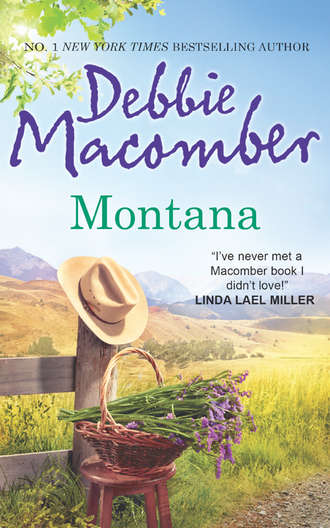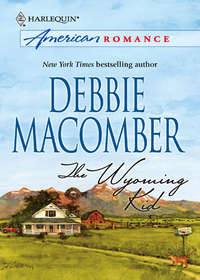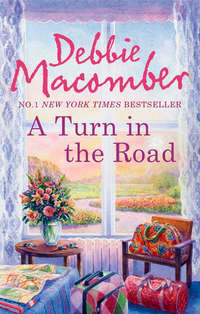
Полная версия
Montana


Praise for #1 New York Times bestselling author DEBBIE MACOMBER
“Well-developed emotions and appealing characters … Macomber is a skilled storyteller who turns [Montana] into an engaging, unabashedly sentimental love story.”
—Publishers Weekly
“Debbie Macomber is one of the most reliable, versatile romance authors around. Whether she’s writing light-hearted romps or more serious relationship books, her novels are always engaging stories that accurately capture the foibles of real-life men and women with warmth and humor.”
—Milwaukee Journal Sentinel
“Debbie Macomber’s gift for understanding the souls of women—their relationships, their values, their lives—is at its peak.”
—BookPage on Between Friends
“Macomber has a gift for evoking the emotions that are at the heart of the genre’s popularity.”
—Publishers Weekly
“A multifaceted tale of romance and deceit, the final installment of Macomber’s Dakota trilogy oozes with country charm and a strong sense of community.”
—Publishers Weekly on Always Dakota
“Macomber … is no stranger to the New York Times bestseller list. She knows how to please her audience.”
—Oregon Statesman Journal
“Macomber’s assured storytelling and affirming narrative are as welcoming as your favorite easy chair.”
—Publishers Weekly on Twenty Wishes
Debbie Macomber
Montana

www.millsandboon.co.uk
Make time for friends. Make time for Debbie Macomber.
CEDAR COVE
16 Lighthouse Road
204 Rosewood Lane
311 Pelican Court
44 Cranberry Point
50 Harbor Street
6 Rainier Drive
74 Seaside Avenue
8 Sandpiper Way
92 Pacific Boulevard
1022 Evergreen Place
1105 Yakima Street
1225 Christmas Tree Lane
BLOSSOM STREET
The Shop on Blossom Street
A Good Yarn
Susannah’s Garden
(previously published as Old Boyfriends) Back on Blossom Street (previously published as Wednesdays at Four) Twenty Wishes Summer on Blossom Street Hannah’s List A Turn in the Road
Thursdays at Eight
Christmas in Seattle
Falling for Christmas
A Mother’s Gift
Angels at Christmas
A Mother’s Wish
A Merry Little Christmas
The Manning Sisters
The Manning Brides
The Manning Grooms
Summer in Orchard Valley
Dedicated to Barb Dooley, with thanks
for blessing my life with her wisdom and friendship
Dear Friends,
My career has taken many twists and turns over the years. It all started back in the late 1970s with a rented typewriter set up at the kitchen table. Between car pools, Cub Scouts, ballet lessons, teaching Sunday school and analyzing new math, I wrote. Day after day, month after month and year after year. As soon as the kids walked out the door for school, Supermom was magically transformed into the struggling young writer.
In those early years all I had to sustain me was my passion for storytelling and my dreams of one day becoming a published writer. I’d close my eyes and picture my name on the cover of a book. I could even see the artwork. For someone who had yet to publish a word of fiction, this was heady stuff. But here I am, more than thirty years later, with literally dozens of published books, translated in more than twenty countries around the world.
I have a lot of people to thank for this incredible opportunity, especially my editor Paula Eykelhof. She’s supported me and my career with energy and enthusiasm. Her insights and editorial skills have helped shape this story and dozens of others from beginning to end.
A special note of appreciation to Geri and Scott Bier, who generously let me call on their ranching expertise. And of course a big kiss to my husband for encouraging me to live my dream. He could complain a great deal more than he does! But mostly, thank you, my loyal readers, for your continued interest and support.
You can reach me through my website at DebbieMacomber.com or Facebook at Debbie Macomber’s World or by letter. Your letters have touched my heart. You can reach me at P.O. Box 1458, Port Orchard, WA 98366.
Again, thank you for your support and encouragement through the years, and don’t forget to dream big yourselves, for who knows where those dreams will take you.

One
“I don’t know how much longer your grandfather’s going to live.”
The words hit Molly Cogan with the force of an unexpected blow. Sinking onto a stool beside the kitchen phone, she blocked out the blare of the television and her sons’ ongoing argument over whose turn it was to set the table for dinner.
Tom and Clay were at each other’s throats, but Molly could only deal with one crisis at a time. “Who is this again, please?”
“Sam Dakota. Listen, I realize this isn’t the best time, but I felt I should tell you.” He paused, then added, “Walt wouldn’t appreciate me calling you, but like I said, you have a right to know his health isn’t good.”
The unmistakable sound of shattering glass filtered through the television noise as the boys’ skirmish escalated.
Placing her hand over the mouthpiece, Molly shouted, “Boys, please! Not now.” Something in her voice must have communicated the importance of the call, because both turned and stared at her. A moment later, Tom reached for the broom.
Molly’s hand trembled as she lifted the receiver back to her ear. “How do you know my grandfather, Mr. Dakota?”
“I’m his foreman. Been here about six months.”
The fact that Gramps had willingly surrendered control of his ranch to a hired hand—a stranger—told her a great deal. For the past few years, he’d sold off portions of the once-huge spread, until all that remained was a couple of thousand acres, small by Montana standards. He’d managed the Broken Arrow Ranch himself as long as she could remember. Hired hands came and went, depending on the size of the herd, but as far as she knew, he’d always maintained tight control of the day-to-day operations. Over the years his letters had been infrequent, but in the last one—which she’d received after Christmas, four and a half months ago—Molly had sensed something wasn’t right with Gramps. She’d put aside the feeling, however, consumed by her own problems.
“Tell me again what happened,” she said abruptly, struggling to regain her composure. The man’s first words had been such a shock, much of what he’d said afterward had escaped her.
“Like I told you, spring’s our busy time, and yesterday your grandfather told me he’d be out to help check on the new calves. When he didn’t show, I returned to the house and found him unconscious on the kitchen floor. Heart attack, I figured.”
Molly pressed her fingers to her lips to hold in a gasp of dismay. Gramps … in pain. Unable to breathe. Losing consciousness. It frightened her to think of it.
With her mother and half brother living in Australia, Gramps was her only family here. Her only connection with her long-dead father.
“I got him to the clinic in town and Doc Shaver confirmed what I thought. It is his heart. Walt has a pacemaker, but the walls of his heart are old and brittle, and it isn’t working as well as Doc had hoped.”
“Gramps has a pacemaker?” Molly cried. “When did this happen?” She raised her hand to the cameo hanging from a gold chain around her neck and clenched it hard. It was the most precious piece of jewelry she owned. Gramps had given it to her the day they buried her grandmother nine years before.
“More than six months ago. First I’d heard of it, too.”
“Why didn’t he tell me?” Molly asked, although she realized Sam Dakota couldn’t possibly know. She wished—not for the first time—that San Francisco was closer to Montana. Right now, Sweetgrass seemed a million miles away.
“I can’t answer that. I thought you should know Walt’s probably not going to live much longer. If you want to see him, I suggest you plan a visit out here soon.”
“What exactly is wrong with his heart?” It might have sounded as if she was avoiding the real issue, but she needed to understand Gramps’s condition before she could even begin to think about anything else. Like her finances. And how she could possibly afford a trip to Montana now.
“Do you know anything about pacemakers?”
“A little.” Just enough to understand that they emit an electronic beep, which assists the heart in beating at a steady pace.
“Well, as I said earlier, the walls of your grandfather’s heart are brittle and it’s difficult to get the pacemaker to function properly. Doc Shaver worked on him a couple of hours, but he couldn’t make any guarantees. Said there’s nothing more he can do. It’s only a matter of time before his heart gives out completely.”
Molly clamped her teeth over her lower lip while she tried to take in what this man was telling her. “I … I appreciate the call. Thank you.” With each word, she felt herself more overwhelmed by emotion. Not Gramps, please dear God, not Gramps. Not yet.
“Sorry to call with such bad news.”
“How … how is he now?” She glanced toward the living room and discovered Tom and Clay standing in the doorway, studying her intently. A smile would have reassured them, but even that was beyond her.
“Better. Will you be coming, then?” the foreman asked.
“I’m not sure.” Molly didn’t see how she could manage it. With the child-support payments cut off and the financial adjustments they’d already been forced to make in the past year, she couldn’t imagine squeezing one more expense into her already stretched budget. Even a short trip would require at least a week away from her job—a contract position without paid holidays. Plus, she’d have the cost of airfare or, more likely, gas and lodging for the drive. She’d have to take the boys; Gramps would want to see them, and they deserved to see him.
“When will you know whether you’re coming?”
It might have been her imagination, but she detected a note of censure. This man knew nothing about her—knew nothing about her circumstances or her life. How dared he stand as judge and jury over her decisions?
“If I knew that, I’d have said something sooner!” Leaning the back of her head against the kitchen wall, Molly tried to think clearly, desperate to find a way, a solution—anything that would lighten the burden of her fears. Never one to weep openly, particularly with strangers, she fought the growing constriction in her throat.
“Then I won’t keep you any longer,” Sam said gruffly.
Molly wanted to shout that he should wait, that she had other questions, but he’d already answered the important ones. What she wanted even more was to hear this stranger tell her Gramps was on the mend.
But he wasn’t going to say that.
“Thank you for phoning,” she said, feeling guilty about the sharp retort she’d made a moment ago. No one enjoyed delivering bad news, and it was kind of Sam Dakota to make sure she learned of her grandfather’s condition. “I’ll let you know if we’re coming for a visit,” she felt obliged to add.
“Fine. Your grandfather should be home in a day or two. I’d consider it a favor if you didn’t mention I called.”
“I won’t. And thank you.” Standing up, she replaced the telephone receiver and looked at her sons. Both had their father’s deep-set dark brown eyes—and both had been born with the ability to look straight through her. At fourteen Tom was growing by leaps and bounds, a gangly youth with feet too big for his body. He hadn’t grown into his height, and had become painfully self-conscious. This was an awkward stage filled with frustrations and raging hormones. They’d once been close, but that had all changed in the past few months. Tom barely talked to her now, no longer sharing confidences the way he used to. Often he was sullen and angry for no apparent reason. His attitude worried Molly; she sensed he was keeping something from her. She tried not to think about it, but every now and then the fear that he was experimenting with drugs or running with the wrong crowd would enter her mind and refuse to go away.
Clay, at eleven, was a younger version of his brother. Neither boy had inherited her auburn hair or clear blue eyes. Both resembled their father’s side of the family—dark-haired and dark-eyed. Not that Daniel’s family had revealed much interest in her sons. But then, neither had Daniel.
“That was about Dad, wasn’t it?” Tom asked, his eyes locked on hers. His shoulders stiffened as though he was bracing himself for her response. The situation with Daniel hadn’t been easy on any of them. They’d seen his name in the newspapers and on television night after night for weeks, that whole time the trial was taking place.
“The call wasn’t about your father,” Molly answered carefully. The kids had been through enough because of Daniel. He’d never been a good father, any more than he’d been a good husband; he had, in fact, left her for another woman. But she’d say one thing for him: until a year ago he’d faithfully paid child support. The payments had stopped when Daniel’s troubles had begun. His legal problems had eventually led to financial problems for her and the boys.
“What did Dad do this time?” Tom demanded, his eyes narrowing suspiciously. It was a look Molly recognized, a look that said Tom, with his newly developed teenage cynicism, wasn’t about to believe any adult. Especially his mother …
“I told you this has nothing to do with your father!” It bothered Molly that her son would assume she’d lie to him. There was nothing she abhorred more than lying. Daniel had taught her and their children more than enough on that subject. “I wouldn’t lie to you.”
“Then what’s wrong?” Clay moved into the kitchen and Molly held out her arms to her youngest son. Clay didn’t object to an occasional hug, but Tom had let it be known he was much too old for that sort of thing—and much too cool to display affection toward his mother. She respected his wishes, and at the same time longed for the times when they could share a simple hug.
“It’s Gramps,” she said. Her throat started to close and she couldn’t say more.
Clay wrapped his arms tightly around her waist and pressed his head to her shoulder. Molly sighed deeply.
“Is Gramps sick?” Tom asked, shoving his hands in his pockets. He paced restlessly, back and forth across the kitchen floor. It’d become a habit of his lately, a particularly irritating one. Oh, yes, Molly thought, sighing again. The last twelve months had been hard on all of them. Tom seemed to be having the toughest time coping with everything—the public humiliation of his father’s trial for fraud, the lack of any extra money and then the move from a spacious three-bedroom house to a cramped two-bedroom apartment. But this place was the best she could do, and his dissatisfaction underscored her own feelings of inadequacy.
“Gramps’s heart is giving him trouble,” Molly finally answered. She spoke in a low toneless voice.
“Are we going to go see him?”
Molly brushed the hair from Clay’s brow and gazed down on his sweet boyish face. “I don’t know yet.”
“But, Mom, don’t you want to?” Tom cried.
That hurt. Of course she did. Desperately. If she had the choice, she’d be on the first plane out. “Oh, Tom, how can you ask me that? I’d give anything to be with Gramps.”
“Then let’s go. We can leave tonight.” Tom headed toward the bedroom he shared with his younger brother, as if the only thing they needed to do was toss a few clothes in a suitcase and walk out the door.
“We can’t,” she said, shaking her head, disheartened once again by the reality of their situation.
“Why not?” Tom’s voice was scornful.
“I don’t have enough—”
“Money,” her oldest son finished for her. He slammed his fist against the kitchen counter and Molly winced, knowing that the action must have been painful. “I hate money! Every time we want to do something or need something, we can’t, and all because of money.”
Molly pulled out a kitchen chair and sagged into it, her energy gone, her spirits deflated by anger and self-pity.
“It’s not Mom’s fault,” Clay muttered, placing his skinny arm around her shoulders, comforting her.
“I don’t know what to do,” Molly said, thinking out loud.
“If you wanted to go by yourself,” Tom offered with a show of reluctance, “I could baby-sit Clay.”
“I don’t need a baby-sitter,” Clay insisted. “I can take care of myself.” He glared at his older brother, challenging Tom to proclaim otherwise.
“I can’t leave now, with or without you boys,” Molly told them sadly. She had less than twenty dollars in her checking account. It was the all-too-familiar scenario—too much month at the end of her money.
“I remember Gramps,” Tom said suddenly. “At least I think I do.”
The last time Molly had visited the ranch was shortly after her divorce almost ten years ago. Her grandmother, who’d already been ill at the time with a fast-spreading cancer, had died shortly afterward. Gramps had asked Molly to come live with him, and for a while she’d seriously considered the invitation. She told herself now that if she’d had any sense, she would have taken him up on his offer. She might actually have done it if she’d managed to find work. Fluent in both French and German, Molly was employed on a contract basis by an import agency. Unfortunately there wasn’t much call for her skills in the cattle country of western Montana.
During that visit Tom had been four and Clay still in diapers. Whatever memories Tom had were more likely the stories she’d told him about the ranch. Tucked against the foothills of the Bitterroot Mountains, the Broken Arrow was one of the lonely ranches scattered through the Flathead River valley. Molly often talked about it, especially after a letter arrived from Gramps. There weren’t many, only two or three a year. Her grandmother had been the one who’d taken care of family correspondence. Molly had discovered that Gramps hated talking on the phone even more than he hated writing letters; nevertheless, he made the effort to keep in touch with her. Each one of his letters was read countless times and treasured. Losing his lifelong love had devastated him, and even now, nine years after her passing, Gramps mentioned his wife in every single letter, every conversation.
Molly always answered his letters and routinely mailed him pictures of the boys. Over the years they’d talked on the phone a number of times but their conversations had obviously been uncomfortable for him. Gramps never had been much of a talker, nor was he like the stereotypical kindly old characters who populated kids’ storybooks. Nope, he was actually a bit of a curmudgeon. He yelled into the telephone as if he thought that was necessary in order to be heard and fretted constantly over what the call was costing.
No small man, he stood a good six-two and weighed at least two hundred pounds. Four-year-old Tom had found his appearance so scary that he’d clung to her leg the first few days of their visit. Clay had buried his face in her shoulder and wailed the instant Gramps came into view. Her grandfather didn’t have the slightest idea how intimidating he could be to small boys.
Had it really been nine years since she’d last seen him? It seemed impossible, yet she knew it was true.
“He yelled,” Tom murmured, lost in his own thoughts.
That was Gramps, all right. He was gruff and impatient and about as subtle as a gun in your face. To really know him was to love him, but he rarely gave anyone the opportunity to get that close. Never afraid to voice his opinions, Gramps went out of his way to make sure folks around him knew what he thought and why; anyone who dared to disagree was called a “danged fool.” Usually to his—or her—face.
When Molly’s grandmother was alive, she’d smoothed the waters. Her charm and humor had more than compensated for Walt Wheaton’s prickly nature. By now, Gramps had probably alienated just about everyone in Sweetgrass.
The foreman who’d phoned said he’d been around for more than six months. If Gramps had mentioned hiring a foreman in any of his letters, she’d missed it—hard to believe, considering how often she’d read them. But knowing Gramps, he’d rather chew nails than admit he needed help.
Sam Dakota. The name sounded almost familiar. She grinned weakly, allowing herself to be amused for just a moment—maybe she was confusing him with South Dakota. Or maybe Gramps had mentioned him, but not in a discussion about hired hands. She was sure of that.
The boys went to bed that evening with a minimum of fuss, for which Molly was grateful. She followed soon after, weary to the bone.
It shouldn’t have come as a surprise that she couldn’t sleep. Every time she closed her eyes, all she could see was Gramps. All she could think about was the cantankerous old man she loved.
At midnight, Molly gave up the effort and turned on the light. Tossing aside the covers, she went to her desk and sorted through the drawers until she found the last letter she’d received from Gramps. She sat on her bed, legs crossed, and read it slowly.
Dear Molly,
Thanks for the pictures of you and the boys. They sure don’t look like they’re any relation to us Wheatons, do they? Guess I can’t hold it against them that they resemble their father. They aren’t to blame for that. The picture of you is another story. Every time I pick it up, it’s like seeing my own sweet Molly at your age. Only she wore her hair long.
I don’t understand what’s with women these days. They cut their hair short like they want to be men. Ginny Dougherty, the gal who ranches the spread next to mine, for instance—damn fool woman thinks she can tend a herd as good as a man, so she decides to look like one. She might be a handsome woman if she kept her hair long and even wore a dress. I tell you, her husband would turn over in his coffin if he could see what she’s done to herself.
As for the hair business, I’ll admit men aren’t much better. Seems a lot of them prefer to wear it long—like back in the sixties, hippies and all. But I never thought I’d see grown men—gray-haired geezers, for Pete’s sake!—wearing ponytails. Even worse—what do you call them?—those pigtails. Far as I’m concerned Willie Nelson’s got a lot to answer for.
It isn’t just the way people do their hair, either. More and more strange things are going on in Sweetgrass. A man doesn’t know who to trust any longer. People talk as if the government was the enemy. I didn’t fight in a world war to hear that kind of crazy talk, but then folks around here never have been keen for my opinion. I give it to them, anyway, whether they want to hear it or not.
The weather’s been good and bad. Winter hasn’t been too hard so far—only one blizzard.
The chickens are laying more eggs than I can use, which means they’re content. There’s nothing better than bacon and eggs for breakfast. I hope you’re feeding the boys a decent breakfast every morning and not that sugar-coated junk.
Now about you. It sounds like Daniel finally got what he’s deserved all along. Imagine cheating those decent folks out of their hard-earned cash! I never did understand why you married that smooth talker. I knew the minute I met him he wasn’t any good. If you’d asked me before you were foolish enough to go through with the wedding, you might have saved yourself a lot of trouble. Well, at least you have your boys, so something good came out of the marriage.








